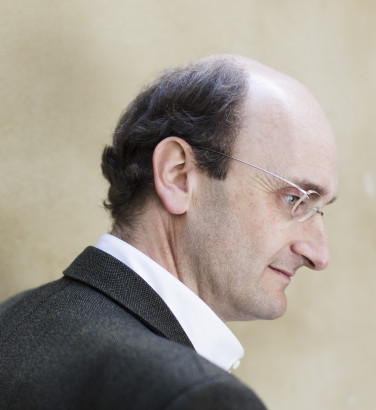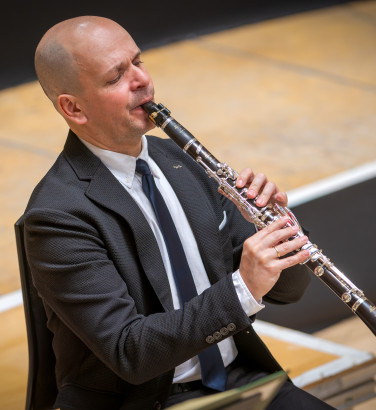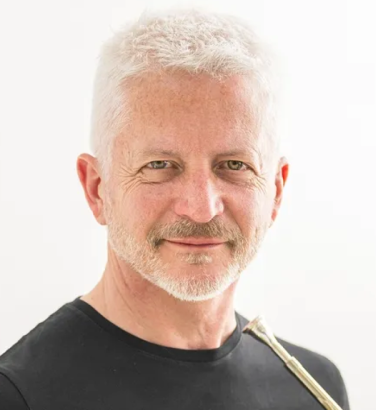
Sally Beamish: "I enjoy waiting to see what pops up next"
11 Sep 2023
News Story
Sally Beamish has a particularly rich history with the SCO, both in the viola section and as a composer. In 1995 she stopped playing altogether, to make time to fulfil her many commissions. She returned to performing in 2015, on an instrument made by her daughter Stephanie Irvine.
Her inclusion in the Orchestra's 2023/24 Digital Season ('From Scotland to the world') was almost a foregone conclusion, which makes us doubly glad that she agreed to an interview in this milestone Season.
Opus California takes an unlikely pairing of Beethoven and American music as its inspiration. How do the two fit together?
The Brodsky Quartet invited me in 1999 to write a piece inspired by Beethoven’s 6 Opus 18 Quartets. I chose the first movement of no.4, as it was one of the first pieces of chamber music I played as a child. Following a visit to California, I was struck by the open, often jazz-inspired language of contemporary American composers, and I took four of the themes from this movement to create four short movements of my own. They are each inspired by music I heard at the Santa Cruz festival, and I was surprised by the direction in which Beethoven’s harmonies led me. This work represents a turning point in my own language - opening up a more direct and expressive style.
As a violist, you have understandably made a significant contribution to that instrument’s repertoire, including a good deal of chamber music. Is this coincidental, or is it a favourite medium of yours?
Although I have written a lot for the viola, including three concertos, I have for instance also written three for piano, and two each for percussion and for saxophone. Commissions tend to come about for different reasons, and are nearly always suggested to me, rather than the other way around. I enjoy waiting to see what pops up next, and the most unexpected commissions often lead me to explore sounds and ideas I wouldn’t otherwise have thought of. The interesting thing for me now is that I’m writing viola parts which I may well be performing myself - never even having tried any of my viola music during the time I wasn’t playing.
What are you working on at the moment?
I’ve just finished a ballet - my second with choreographer Sir David Bintley. It’s A Christmas Carol for Finnish National Ballet - to be premiered in December in Helsinki. Ballet feels like a natural medium for me – as a lot of my music is ‘programmatic’, theatrical, and pictorial.
This summer has been largely dedicated to playing, as I was composer in residence at the Australian Festival of Chamber Music, while also performing; including performing the premiere of Crescent, for trumpet, viola and piano.
In the next months I begin work on concertos for various instruments, including clarinet, and double concertos for violin/double bass, and clarinet/saxophone.
I’m also preparing a recital of Bach, Beamish and Bridge, with pianist Nancy Cooley, at Chapel Royal, Brighton, in November.

An archive photo of Natural Arches Beach, the inspiration for the final movement of Opus California. There were originally three arches, and the one seen to the left collapsed in 1980.
With the 2023/24 Season marking the SCO’s 50th anniversary, what are your memories of working with the Orchestra?
I joined the SCO as principal viola in 1987. One of the first pieces I performed with them was Schönberg’s Verklärte Nacht, with Sir Peter Maxwell Davies conducting. I remember a conversation over coffee when we discussed how we were both composers at heart, and felt less comfortable as performers. A few years later, when I moved to Scotland to concentrate on composing, he gave me one of the 10 Strathclyde Concerto projects: I worked in 5 schools in Bute and Argyll alongside composer Elaine Agnew, and created a work for 5 school bands and the SCO. One of the bands was a pipe band, and that was the beginning of my fascination with pibroch. The Lost Pibroch was the first of 11 works I have written for the SCO. Max also asked me to be his assistant on his course in Hoy, Orkney, which involved musicians from the SCO. I remember feeling totally inadequate in the role, and wishing I was one of the students instead. I learnt a huge amount from him, and our friendship was a very precious part of my life.
In my year playing with the orchestra (Ian Ritchie was director in those days) I also remember Bartok’s Music for Strings, Percussion and Celeste, conducted by its commissioner, Paul Sacher. And the recording of Tippet conducting his complete string music. There were some fantastic experiences, and great repertoire.
In 1998, Gregor Zubicky, an oboist I had played with in the 80s, invited me to be composer in residence with the Swedish Chamber Orchestra, where he had recently become artistic director. Roy McEwan embraced the idea of a twinning with the SCO and Swedish composer Karin Rehnqvist, who is now a life-long friend. We each wrote 4 works for the two orchestras, which are all now performed regularly.
Looking ahead to the next fifty years, are there any of your works you’d particularly like the SCO to revive?
The works that perhaps mean the most to me from my residency period are my second viola concerto: The Seafarer (2002), for Tabea Zimmermann, and The Imagined Sound of Sun on Stone (1999) – for saxophonist John Harle, which was inspired by Orkney, premiered at the St Magnus Festival, and recorded later with the Swedish Chamber Orchestra. It has just been recorded a second time by Branford Marsalis and the Virginia Symphony.
Much more recently, in 2013, I wrote Flodden for the SCO - for soprano Shuna Scott Sendall. I would love that work to enter the repertoire.
But the work I’d most like to hear again is Monster (1996) - with writer Janice Galloway. We wrote a 30-minute concert piece about Mary Shelley - for actor, soprano and the SCO, which preceded our opera of the same name. It was part of a series of collaboration-based SCO commissions, which included James MacMillan’s ‘I’.
It was a great pleasure that James MacMacmillan conducted Trance o Nicht – with Evelyn Glennie as soloist. Along with Max, Jimmy was hugely encouraging of my move to Scotland and my transition to full-time composition.
Another special premiere was when Oliver Knussen conducted Sangsters in 2002. I had loved playing Wolf’s Italian Serenade in 1987 when Olly conducted the SCO, and he was an important influence on my work over the years.
Most of the other works were premiered by Joseph Swensen – a very important and inspiring collaboration, as my fruitful relationship with the SCO grew and developed.
Related Stories
![]()
Andrew Manze: "I've always loved Viennese waltzes and polkas"
1 December 2025
Our Principal Guest Conductor is really looking forward to conducting our Viennese New Year concerts!![]()
Maximiliano Martín: "A friend said 'Gnarly Buttons would suit you very well'"
10 November 2025
Ahead of his performance of John Adams' Gnarly Buttons, we spoke to our Principal Clarinet about performing as soloist with the Orchestra.![]()
Quickfire Questions with Kenneth Henderson
7 November 2025
Get to know our new Principal Horn!


